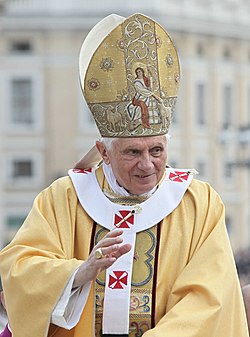Pope Benedict XVI Quote
In the course of my intellectual life I experienced very acutely the problem of whether it isn't actually presumptuous to say that we can know the truth - in the face of all our limitations. I also asked myself to what extent it might not be better to suppress this category. In pursuing this question, however, I was able to observe and also to grasp that relinquishing truth doesn't solve anything but, on the contrary, leads to the tyranny of caprice. In that case, the only thing that can remain is really what we decide on and can replace at will. Man is degraded if he can't know truth, if everything, in the final analysis, is just the product of an individual or collective decision.In this way it became clear to me how important it is that we don't lose the concept of truth, in spite of the menaces and perils that it doubtless carries with it. It has to remain as a central category. As a demand on us that doesn't give us rights but requires, on the contrary, our humility and our obedience and can lead us to the common path.
In the course of my intellectual life I experienced very acutely the problem of whether it isn't actually presumptuous to say that we can know the truth - in the face of all our limitations. I also asked myself to what extent it might not be better to suppress this category. In pursuing this question, however, I was able to observe and also to grasp that relinquishing truth doesn't solve anything but, on the contrary, leads to the tyranny of caprice. In that case, the only thing that can remain is really what we decide on and can replace at will. Man is degraded if he can't know truth, if everything, in the final analysis, is just the product of an individual or collective decision.In this way it became clear to me how important it is that we don't lose the concept of truth, in spite of the menaces and perils that it doubtless carries with it. It has to remain as a central category. As a demand on us that doesn't give us rights but requires, on the contrary, our humility and our obedience and can lead us to the common path.
Related Quotes
About Pope Benedict XVI
Ordained as a priest in 1951 in his native Bavaria, Ratzinger embarked on an academic career and established himself as a highly regarded theologian by the late 1950s. He was appointed a full professor in 1958 when aged 31. After a long career as a professor of theology at several German universities, he was appointed Archbishop of Munich and Freising and created a cardinal by Pope Paul VI in 1977, an unusual promotion for someone with little pastoral experience. In 1981, he was appointed Prefect of the Congregation for the Doctrine of the Faith, one of the most important dicasteries of the Roman Curia. In 2002, he also became Dean of the College of Cardinals. Before becoming pope, he had been "a major figure on the Vatican stage for a quarter of a century"; he had had an influence "second to none when it came to setting church priorities and directions" as one of John Paul II's closest confidants. Following the death of John Paul II on 2 April 2005, a conclave elected Ratzinger as his successor on 19 April; he chose Benedict XVI as his papal name in honour of Benedict XV and Benedict of Nursia.
Benedict's writings were prolific and generally defended traditional Catholic doctrine, values, and liturgy. He was originally a liberal theologian but adopted conservative views after 1968. During his papacy, Benedict advocated a return to fundamental Christian values to counter the increased secularisation of many Western countries. He viewed relativism's denial of objective truth, and the denial of moral truths in particular, as the central problem of the 21st century. Benedict also revived several traditions and permitted greater use of the Tridentine Mass. He strengthened the relationship between the Catholic Church and art, promoted the use of Latin, and reintroduced traditional papal vestments, for which reason he was called "the pope of aesthetics". He also established personal ordinariates for former Anglicans and Methodists joining the Catholic Church. Benedict's handling of sexual abuse cases within the Catholic Church and opposition to usage of condoms in areas of high HIV transmission was criticized by public health officials, anti-AIDS activists, and victim's rights organizations.
Citing health reasons due to his advanced age, Benedict resigned as pope on 28 February 2013. He became the first pope to resign from office since Gregory XII in 1415, and the first without external pressure since Celestine V in 1294. He subsequently moved into the newly renovated Mater Ecclesiae Monastery in Vatican City for his retirement. The 2013 conclave elected Francis as his successor on 13 March. In addition to his native German language, Benedict had some proficiency in French, Italian, English, and Spanish. He also knew Portuguese, Latin, Biblical Hebrew, and Biblical Greek. He was a member of several social science academies, such as the French Académie des Sciences Morales et Politiques.
